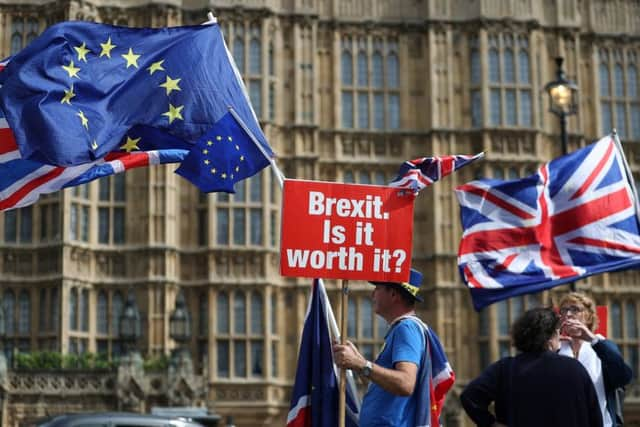The Yorkshire Post says: On ‘Brexit Day’, Britain remains all at sea over EU departure
It would have been an historic event that would have split opinions in the country between joy, despair but also for many, a sense of relief that a new chapter was beginning at last after the rancour and division that surrounded the 2016 referendum and has continued almost unabated ever since.
But instead, today will be another day of deep uncertainty as a third vote on Mrs May’s Withdrawal Agreement – minus the section of the Political Declaration outlining the UK’s intended future relationship with the EU – takes place.
Advertisement
Hide AdAdvertisement
Hide AdA recent poll for Sky News found 90 per cent of the British public consider the handling of the Brexit negotiations to have been a “national humiliation”. It is difficult to disagree. There has been a litany of mistakes and misjudgements that has led to the current extraordinary situation, where the Prime Minister’s plan for Brexit appears incapable of passing muster with MPs – even with her promise to resign to get it through – while Parliament is unable to agree on an alternative course of action.


It is impossible to predict when Brexit will happen, in what form it will happen and even if it will happen at all.
Back in 2013, David Cameron promised a referendum if the Conservatives won the 2015 General Election at a time when it appeared coalition Government was here to stay. After his party’s surprise victory was followed by frustrating negotiations with the EU that did not achieve the substantive reforms he had pledged, Mr Cameron’s fateful decision to become the face of the Remain campaign alongside his Chancellor George Osborne saw the referendum, in part, become an opportunity for voters to deliver a proxy verdict on six years of their austerity agenda. It also allowed Leave campaigners to position themselves as anti-Establishment underdogs, linking the cost of EU membership with growing concerns about public spending in areas such as the NHS and schools.
The central message of the Remain campaign – that people would be worse off outside the EU – simply did not ring true in many financially-stretched households, while the argument that the UK should have greater control over its own laws and borders appeared simple common sense compared to the more complex Remain reasoning that having a seat at the table as part of a wider multi-national power gave Britain more global status. Mr Cameron’s misjudgements cost him the vote and with it his job, as Theresa May’s own mistakes are now due to claim hers.
Advertisement
Hide AdAdvertisement
Hide AdMrs May was hamstrung by her predecessor’s failure to prepare for the eventuality of a Leave vote. But the former Remain supporter went on to set out red lines on leaving the single market and customs union designed to both honour the result of the referendum as she saw it but also to bolster her credentials with Brexiteers.
However, her attempt to get public rather than Parliamentary backing for the negotiating plan, through calling a general election in 2017 after she had already triggered Article 50, proved disastrous. The loss of the Conservatives’ majority – and their expensive, in every sense, reliance on the Democratic Unionist Party – has led directly to the situation where Mrs May is unable to pass her Withdrawal Agreement, even with previously-intransigent Brexiteers within her own party belatedly coming around to it. Mrs May is very far from the only person who must shoulder blame. But on what should have been an historic day, Britain remains at sea over Brexit.